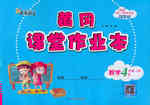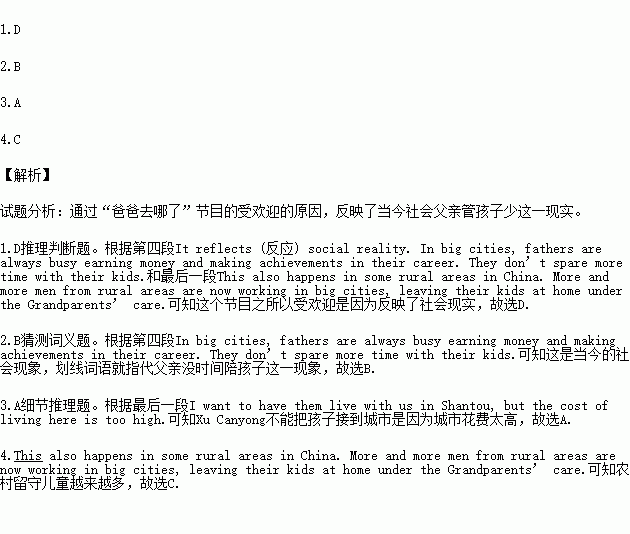题目内容
Recently, the TV show Where Are We Going, Dad? has become one of China’s most popular TV shows, attracting more than 600 million viewers each week.
In this program, five celebrity(名人) fathers traveled to six countryside locations across China, including some villages in Beijing, Yunnan, Shandong, Hunan, Heilongjiang and a desert in Ningxia.
They took care of their kids without the help of the kid’s mothers. At the same time, they also took part in different kinds of activities with their kids together, such as cooking, fishing and selling goods.
Why is the show so popular? “It reflects (反应) social reality. In big cities, fathers are always busy earning money and making achievements in their career. They don’t spare more time with their kids.” said Xie Dikui, general director of the show. As the father of a 3-year-old daughter, Xie said that he found his own heart being touched as he made it. “Although these fathers are busy, they are able to spare time for their kids. We can do better than them.”
This also happens in some rural areas in China. More and more men from rural areas are now working in big cities, leaving their kids at home under the Grandparents’ care. “I have a son and a daughter in my hometown.” said Xu Canyong, a 33-year-old man working in Shantou, Guangdong Province. “They come to live with me only during summer and winter vacations. I miss them very much. I want to have them live with us in Shantou, but the cost of living here is too high.” said Xu.
1.The TV show Where Are We Going, Dad? is popular mainly because _______ .
A. the five fathers are all famous stars
B. there are many beautiful sights in it
C. Xie Dikui is a popular director in China
D. it reflects the problems about family education
2.The underlined word “This” in Paragraph 4 refers to_________ .
A. the TV show Where Are We Going, Dad?
B. the fact that fathers have less time with their kids
C. the trip of five celebrity fathers with their kids
D. the relationship between Xie Dikui and his daughter
3.Xu Canyong can’t live with his two kids in Shantou because________ .
A. he can’t afford to live there together
B. he has no time to look after his kids
C. Shantou is too far from his hometown
D. his kids are used to living with their grandparents
4.From this passage, we may infer ________ .
A. fathers will raise the kids instead of mothers
B. the five celebrity fathers will give up their own jobs
C. in some rural areas, more and more kids live with their grandparents
D. Mr Xu often goes back to his hometown during summer and winter vacations
 中考利剑中考试卷汇编系列答案
中考利剑中考试卷汇编系列答案 教育世家状元卷系列答案
教育世家状元卷系列答案 黄冈课堂作业本系列答案
黄冈课堂作业本系列答案

 ),并在其下面写出该加的词。
),并在其下面写出该加的词。 )划掉。
)划掉。